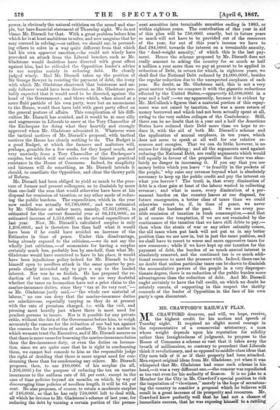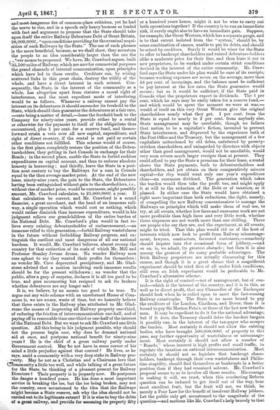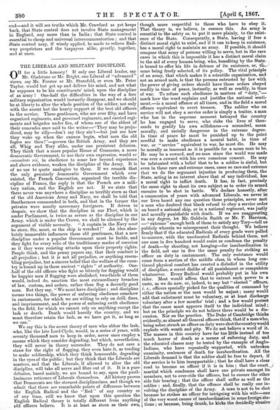MR. CRAWFORD'S RAILWAY PLAN M ,. R. CRAWFORD deserves, and
will, we hope, receive the highest credit for his motion and speech of Tuesday night. It required no slight moral courage in the representative of a commercial aristocracy, a man whose weight depends upon his reputation for solidity rather than farsightedness of judgment, to propose to the; House of Commons a scheme so vast that it takes sway the- breath of millionaires, so contrary to precedent that Liberals think it revolutionary, and so opposed to middle-class ideas that City men talk of it as if their property had been attacked. Men expect original ideas from Mr. Gladstone, yet when it was whispered that Mr. Gladstone had some such scheme in his head,—it was a very different one,—the rumour was repudiated as too vast even for his audacity of finance. It is no joke to a Member for the City in Mr. Crawford's special position to risk the imputation of "viewiness," merely in the hope of accustom- ing the country to consider a proposal which he believes will result in a great increase of its prosperity and resources. Mr. Crawford knew perfectly well that he had not a chance of immediate success, that he was exposing himself to a rattling
and most dangerous fire of common-place criticism, yet he had the nerve to rise, and in a speech only heavy because so loaded with fact and argument to propose that the State should take upon itself the entire Railway Debenture Debt of Great Britain, 98,000,000/., "upon conditions providing for the eventual acqui- sition of such Railways by the State." The use of such phrases is the more beneficial, because, as we hall show, they accustom the people to an idea considerably larger than the one the „ver means to propound. We have, Mr. Crawford argues, built
t413,500 miles of Railway, which are now for commercial purposes the grand channels of internal communication, upon principles
which have led to these results. Creditors can, by seizing scattered links in this great chain, destroy the utility of the whole, and have a direct interest in such seizure. Con- sequently, the State, in the interest of the community as a whole, has altogether apart from statutes a moral right of interference, and the most expedient mode of interfering would be as follows. Whenever a railway cannot pay the interest on its debentures it should surrender its freehold to the State, which should then guarantee the debentures at a fair rate, —rate being a matter of detail,—lease the freehold back to the Company for ninety-nine years, provide either by a rental or otherwise for the payment to itself of the obligations thus encountered, plus 1 per cent. for a reserve fund, and thence- forward retain a veto over all new capital, expenditure, and right of direct re-entry, if the rental is not paid or certain other conditions not fulfilled. This scheme would of course,
in the first place, completely restore the position of the Deben- tureholders, they getting in fact Consols in exchange for their Bonds ; in the second place, enable the State to forbid reckless
expenditures on capital account, and thus to enforce absolute honesty in borrowing ; and thirdly, leave the State in a posi- tion next century to buy the Railways for a sum in Consols equal to the then average market price. At the end of the new lease, ninety-nine years, the gain to the State, the Debentures
having been extinguished without gain to the shareholders, i.e.,
without rise of market price, would be enormous, might possibly amount, Mr. Crawford calculates, to 25,000,000/. a year. If that calculation be correct, and Mr. Crawford is a sound
financier, a great merchant, and the head of an immense rail- way, a single operation which would cost us nothing, which
would rather diminish than increase expenditure, would in his judgment relieve our grandchildren of the entire burden of the National Debt. Mr. Crawford's plan would in fact re- lieve every existing debentureholder of embarrassment,—an immense relief to this generation,—forbid Railway wastefulness in the future without forbidding Railway progress, and ex- tinguish the costliest and most dangerous of all our national burdens. It would, Mr. Crawford believes, almost recoup the country for that extinction of its coals of which Mr. Mill and
Professor Stanley Jevons dream. -No wonder Railway men rose aghast to 'say they wanted their profits for themselves ; no wonder Mr. Cave deprecated precipitancy, and Mr. Glad-
stone advised that a motion involving such immense results should be for the present withdrawn ; no wonder that the public, after a gasp of surprise, declares it is all too good to be true, and goes murmuring but resigned to ask its brokers whether debentures are any longer safe I It is, we believe, by no means too good to be true. To argue out any wide scheme with an unreformed House of Com- mons is, we are aware, waste of time, but we honestly believe
that there exists in the Railway plan attributed to Mr. Glad- stone the means of improving all Railway property one-third,
of reducing the friction of intercommunication one-half, and of paying off in reasonable time one-third or one-half of the interest of the National Debt. But we want to ask Mr. Crawford one little question. All this being in his judgment possible, why should
not the process begin now, why does he demand national aid at once, and postpone national benefit for ninety-nine years He is the chief of a great railway partly under Government control. May he not have in some corner of his mind a little prejudice against that control? He lives, as he says, amid a community with a very deep stake in Railway pro- =Ierty. May he not as a Christian and a Chairman love that tommunity a little too well, and while talking of a great future for the State, be thinking of a pleasant present for Railway Directors Their property is in jeopardy now. He postpones the danger a hundred years. He has done a most important service in breaking the ice, but the ice being broken, may not the country, once accustomed to the idea that the Railways might become a State reserve, ask why the idea should not be carried out to its legitimate extent? If it is wise to buy the debts of a great railway, and provide for assuming its property fifty or a hundred years hence, might it not be wise to carry out both operations together? If the country is to run an immediate risk, it surely ought also to have an immediate gain. Suppose, for example, the Great Western, which has a separate gauge, and is to that extent isolated from the "system," should be, by some combination of causes, unable to pay its debts, and should be seized by creditors. Surely it would be wiser for the State to offer to bankrupt shareholders and ruined debenture-holders alike a moderate price for their line, and then lease it out to new proprietors, to be worked under certain strict conditions devised in the interest of the entire community. Mr. Craw- ford says the State under his plan would be sure of its receipts, because working expenses are never, on the average, more than 48 per cent. of incomings, and the balance must be sufficient to pay interest at the low rates the State guarantee would secure ; but so it would be sufficient, if the State paid in Consols what the proprietors expect in dividends. The 1 per cent. which he says may be easily taken for a reserve fund,— and which would be spent the moment we were at war,— would of itself on this very Great Western give the original ,shareholders nearly what they get. 1 per cent. from the State is equal to nearly to 2 per cent. from anybody else. State management may be unreliable, though we believe that notion to be a capitalist's fiction, invented to prevent State interference, and disproved by the experience both of the Post Office and the Treasury, but the management of a few capitalists unburdened by old debts, unfettered by poverty- stricken shareholders, and unimpeded by directors with objects other than good management, would not be unreliable, would very soon return much larger receipts than at present. They could afford to pay the State a premium for their lease, a rental above the State payments, both to debentureholders and shareholders, and yet obtain on their comparatively minute capital—for they would want only one year's expenditure clear—an enormous dividend. The generation which takes the burden would then take the profit too, and might apply it at will to the reduction of the Debt or of taxation, as it pleased. In either case the State would have obtained a right more important than both reductions, the right, namely, of compelling the new Railway concessionaires to manage the Railways on principles which will make them of real use, to try, at all events, whether low fares and enormous work are not more profitable than high fares and very little work, whether three sixpences are not worth more than one shilling. There are people who say they are, and the experiment, at all events, might be tried. That this plan would rid us of the host of interests which now look to profit from Railway mismanage- ment, lawyers, contractors, favoured customers,—somebody should inquire into that occasional form of jobbery,—and so on, is, we admit, its greatest obstacle ; but then it is also among the greatest of its many probable advantages. The Irish Railway proprietors are actually clamouring for this course, and though it is a great shame that a magnificent experiment should be tried first of all under Irish conditions, still even an Irish experiment would be preferable to Mr. Crawford's alternative scheme.
It is the right of control—not of management, but of con- trol—which is the interest of the country, and it is to this, as well as to direct profit, that any Chancellor of the Exchequer should look when he is called upon to meet the fast-coming Railway catastrophe. The State is no more bound to pay the creditors of the London, Chatham, and Dover, than it is bound to pay Sir Morton Peto's, or those of the last new Guards- man. It may be expedient to do it for the national advantage, but if it does, the Treasury should drive the hardest bargain it possibly can, in the interest of the tax-payer who accepts the burden. Most certainly it should not allow the existing bodies, who have brought 500,000,000/. of property to this pass, any further opportunity of wastefulness or mismanage- ment. Most certainly it should not allow a number of "Boards," whose interest is high profits and small traffic, to regulate the taxation on national intercommunication. Most certainly it should not so legislate that bankrupt share- holders, bankrupt through their own wastefulness and Philis- tine stupidity, should find themselves as bankrupts in a better position than if they had remained solvent. Mr. Crawford's proposal seems to us to involve all those results. His courage in making it will, we trust, when this everlasting Reform question can be induced to get itself out of the way, hear most excellent fruit, but the fruit will not, we think, be merely a Poor Law for the benefit of insolvent Railway jobbers. Let the public only get accustomed to the' magnitude of the question—and motions like Mr. Crawford's help bravely to that
end—and it will see truths which Mr. Crawford as yet keeps back, that State control does not involve State management in England, any more than in India ; that State control is essential to cheap and universal intercommunication ; and that State control may, if wisely applied, be made to relieve Rail- way proprietors and the taxpayers alike, greatly, together, and at once.
































 Previous page
Previous page